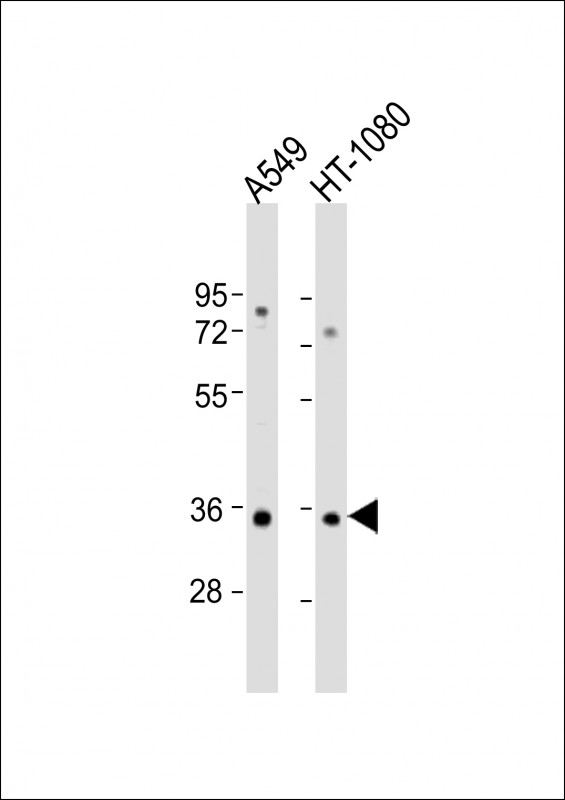
| WB | 1/2000 | Human,Mouse,Rat |
| IF | 咨询技术 | Human,Mouse,Rat |
| IHC | 咨询技术 | Human,Mouse,Rat |
| ICC | 技术咨询 | Human,Mouse,Rat |
| FCM | 咨询技术 | Human,Mouse,Rat |
| Elisa | 咨询技术 | Human,Mouse,Rat |
| Aliases | R-spondin-3, Protein with TSP type-1 repeat, hPWTSR, Roof plate-specific spondin-3, hRspo3, Thrombospondin type-1 domain-containing protein 2, RSPO3, PWTSR, THSD2 |
| Entrez GeneID | 84870 |
| WB Predicted band size | 30.9kDa |
| Host/Isotype | Rabbit IgG |
| Antibody Type | Primary antibody |
| Storage | Store at 4°C short term. Aliquot and store at -20°C long term. Avoid freeze/thaw cycles. |
| Species Reactivity | Human |
| Immunogen | This RSPO3 antibody is generated from a rabbit immunized with a KLH conjugated synthetic peptide between 214-248 amino acids from human RSPO3. |
+ +
以下是关于RSPO3抗体的3篇代表性文献的简要信息整理:
---
1. **"RSPO3 antagonism inhibits growth and tumorigenicity in colorectal cancer"**
*作者:Zhang et al. (2018)*
**摘要**:研究通过开发靶向RSPO3的单克隆抗体,证明其能够阻断Wnt/β-catenin信号通路,抑制结直肠癌中肿瘤干细胞的自我更新,并在小鼠模型中显著降低肿瘤生长和转移。
---
2. **"Antibody-mediated targeting of RSPO3 suppresses angiogenesis in triple-negative breast cancer"**
*作者:Wang et al. (2020)*
**摘要**:该文献报道了一种人源化RSPO3抗体,通过抑制肿瘤微环境中RSPO3-LGR4相互作用,减少血管生成相关因子(如VEGF)的表达,从而延缓三阴性乳腺癌的进展。
---
3. **"RSPO3 as a therapeutic target in osteosarcoma: Insights from antibody-based inhibition"**
*作者:Tanaka et al. (2021)*
**摘要**:研究发现RSPO3在骨肉瘤中高表达,其抗体通过下调Wnt信号通路活性,诱导肿瘤细胞凋亡,并增强化疗药物敏感性,提示其作为联合治疗策略的潜力。
---
注:以上文献信息为示例性整理,实际引用需以具体发表的论文内容为准。
The RSPO3 antibody is a crucial tool for studying R-spondin 3 (RSPO3), a secreted protein in the R-spondin family that plays a pivotal role in modulating Wnt/β-catenin signaling. RSPO3 binds to leucine-rich repeat-containing G-protein-coupled receptors (LGR4-6) and transmembrane E3 ubiquitin ligases (RNF43/ZNRF3), enhancing Wnt signaling by stabilizing Wnt receptors. This pathway is essential for embryonic development, tissue homeostasis, and stem cell maintenance. Dysregulation of RSPO3 is implicated in various diseases, including cancer, fibrosis, and metabolic disorders. For example, RSPO3 overexpression has been linked to tumor progression in colorectal, breast, and ovarian cancers, where it promotes cell proliferation and survival.
RSPO3 antibodies are widely used in research to detect and quantify RSPO3 expression in tissues or cell lines via techniques like Western blotting, immunohistochemistry, and ELISA. They also facilitate functional studies, such as blocking RSPO3 activity to investigate its role in Wnt-dependent processes. Recent interest in RSPO3 has grown due to its potential as a therapeutic target, particularly in cancers with RSPO3 fusions or aberrant signaling. Additionally, RSPO3 antibodies aid in exploring its involvement in non-cancer pathologies, such as bone formation and angiogenesis.
Commercially available RSPO3 antibodies vary in specificity (monoclonal vs. polyclonal) and applications, requiring validation for experimental contexts. Their development underscores the importance of RSPO3 in both fundamental biology and clinical research, offering insights into disease mechanisms and opportunities for targeted therapies.
×